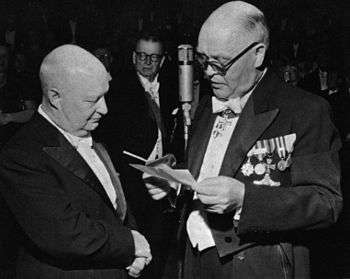Jenny and Antti Wihuri Foundation
The Jenny and Antti Wihuri Foundation is a Finnish non-profit organization founded in 1942 by industrialist Antti Wihuri and his wife, Jenny Wihuri, with the purpose of supporting cultural and economic development in Finland. The Foundation awards scholarships and prizes on an annual basis on October 9, the birthday of Antti Wihuri. Between 1942 and 2016, the Foundation had awarded grants of 274 million of euros.[1][2] In 2016, the total value of grants and prizes awarded by the Foundation amounted to 11,2 million euros.[3]
Wihuri Research Institute
The Jenny and Antti Wihuri Research Institute was founded in 1944 with the aim of creating the conditions for high-quality research in the field of natural sciences, medicine and technical sciences. The Wihuri Research Institute focuses on cardiovascular research, and is particularly renowned for the innovative research it conducts on major chronic diseases. The Institute is currently headed by Professor Kari Alitalo.
Art collection
Since 1957, the Jenny and Antti Wihuri Foundation has built up a large collection of Finnish contemporary art. In 1983, the Foundation’s Board of Directors donated nearly 500 pieces of the collection to the City of Rovaniemi on the occasion of the 100th anniversary of Atti Wihuri’s birth.
Wihuri Foundation for International Prizes
The Wihuri Foundation for International Prizes was founded in 1953 by Antti Wihuri. The Fund’s purpose is to distribute international awards, notably the Wihuri Sibelius Prize in recognition of creative work that has specially furthered and developed the cultural and economic progress of mankind. These prizes may be awarded to private individuals or organizations regardless of nationality, religion, race or language. Throughout its 62 years of operating the Foundation has awarded 35 prizes in total of which 18 have been Wihuri International Prizes awarded to scientists.
Wihuri Sibelius Prize

| Year | Recipient[4] | Country |
|---|---|---|
| 1953 | Jean Sibelius | Finland |
| 1955 | Paul Hindemith | Germany |
| 1958 | Dmitri Šostakovitš | Soviet Union |
| 1963 | Igor Stravinsky | United States |
| 1965 | Benjamin Britten | United Kingdom |
| Erik Bergman | Finland | |
| Usko Meriläinen | Finland | |
| Einojuhani Rautavaara | Finland | |
| 1971 | Olivier Messiaen | France |
| 1973 | Witold Lutoslawski | Poland |
| Joonas Kokkonen | Finland | |
| 1983 | Krzysztof Penderecki | Poland |
| Aulis Sallinen | Finland | |
| 2000 | György Ligeti | Italy / Austria |
| 2003 | Magnus Lindberg | Finland |
| 2006 | Per Nørgård | Denmark |
| 2009 | Kaija Saariaho | Finland |
| 2012 | György Kurtág | Hungary |
| 2015 | Harrison Birtwistle | United Kingdom |
Wihuri International Prizes
| Year | Recipient[5] | Country |
|---|---|---|
| 1958 | Rolf Nevanlinna | Finland |
| 1961 | Väinö Hovi | Finland |
| Pentti I. Halonen | Finland | |
| 1968 | John McMichael | United Kingdom |
| Lars Ahlfors | United States | |
| 1971 | Peter Hirsch | United Kingdom |
| 1976 | Georg Henrik von Wright | Finland |
| Jaakko Hintikka | Finland | |
| 1979 | Derrick B. Jelliffe | United States |
| 1982 | Aldo van Eyck | Netherlands |
| 1983 | Aksel C. Wiin-Nielsen | Denmark |
| 1985 | John Williams Mellor | United States |
| 1988 | Kullervo Kuusela | Finland |
| 1991 | Kari I. Kivirikko | Finland |
| 1994 | Olli V. Lounasmaa | Finland |
| 1997 | Niilo B. Hallman | Finland |
| 2003 | Barbara Czarniawska | Poland |
| 2012 | Merja Penttilä | Finland |
| 2015 | Thania Paffenholz | Switzerland |
Sources
- "Apurahan hakeminen". Archived from the original on 2015-09-16. Retrieved 2016-02-24.
- Ilta-Sanomat 9.10.2011.
- "Jenny ja Antti Wihurin rahasto jakoi yli 11 miljoonaa – tässä poimintoja apurahan saajista". Helsingin Sanomat. October 9, 2015.
- http://wihuriprizes.fi/wihurin-sibelius-palkinto/ Wihurin Sibelius-palkinto
- "Wihurin kansainvälinen palkinto".